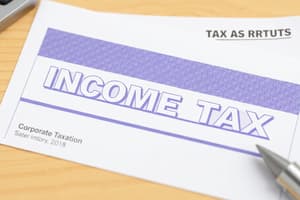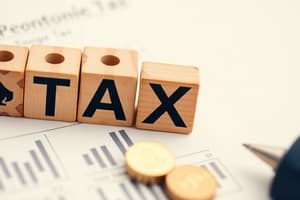Podcast
Questions and Answers
What must be included in the proper books of accounts as required by Section 89 of the Income Tax Act?
What must be included in the proper books of accounts as required by Section 89 of the Income Tax Act?
- Investment purchase receipts
- Records of daily transactions, cash received and paid (correct)
- Annual budget forecasts
- Only profit and loss statements
Which type of accounting method considers income when it is earned regardless of when it is received?
Which type of accounting method considers income when it is earned regardless of when it is received?
- Hybrid accounting
- Capital accounting
- Accruals accounting (correct)
- Cash basis accounting
Which of the following is considered an allowable expense when calculating taxable profits?
Which of the following is considered an allowable expense when calculating taxable profits?
- Purchase of new equipment for business
- Interest on loans for personal use
- Wages and salary paid to employees (correct)
- Repairs that improve the value of an asset
What is the purpose of the 'wholly and exclusively' rule in taxation?
What is the purpose of the 'wholly and exclusively' rule in taxation?
When can rent expenses be considered allowable deductions in business taxation?
When can rent expenses be considered allowable deductions in business taxation?
Flashcards
Allowable Expenses (Companies)
Allowable Expenses (Companies)
Expenses a company can deduct from its income when calculating taxable profit.
Accounting Profit vs. Taxable Profit
Accounting Profit vs. Taxable Profit
Accounting profit is calculated using standard accounting methods, while taxable profit is the adjusted figure used for taxation.
Disallowable Expenses
Disallowable Expenses
Costs or expenditures that a company cannot deduct when calculating taxable profits.
Year of Assessment
Year of Assessment
Signup and view all the flashcards
Method of Accounting (Companies)
Method of Accounting (Companies)
Signup and view all the flashcards
Study Notes
Advanced Taxation: Taxation of Companies
- Presentation Outline: Includes identifying activities as trade, applying the wholly and exclusive rule, discussing new tax measures, explaining interest treatment in corporation tax, and detailing taxation implications for preference dividends, investment income, tax losses, and tax payment/estimated tax.
Income from Trade, Business, Profession & Vocation
- Accounting Profit: Accounting profit needs adjustment to determine assessable profit for tax.
- Books of Accounts: Section 89 of the Income Tax Act mandates proper books of accounts kept in English. These books must record all transactions to determine profit/loss, with details including daily cash transactions, annual stocktaking (if relevant), and accounts of all goods sold/purchased.
- Method of Accounting: Accruals vs. cash basis are used, with the Willingdale vs Int'l Commercial Bank (UK, 1977) case as a reference point.
- Year of Assessment: Defined as 12 months beginning January 1st each year, with a "permitted accounting date" concept.
- Measuring Income: Income equals gross receipts minus the cost of earning those receipts, distinguishing between trading and capital receipts.
Allowable Expenditure
- Interest: Interest on money borrowed for capital employed in a business (long-term basis) is allowable.
- Rent, Repairs, Plant and Machinery: Rent is allowable when used to produce income, apportioned based on trade use. Repairs are allowable, but extensive repairs resulting in a new asset are not; instead, they're treated as capital expenses. Immediate post-purchase repairs may be considered capital expenditure.
- Disbursements related to Employees: Wages, salaries, social security contributions, education tax are allowable employee deductions. Employer advances for commissions/salary vs. loans are explicitly addressed. Severance pay is an allowable expense if wholly and exclusively incurred to acquire income.
- Contributions to Retirement Fund: Ordinary annual contributions to an approved superannuation scheme (where the contribution is ≤ 20% of employee remuneration) are allowable.
- Bad Debts: Debts due to the taxpayer are allowable, while debts payable by the taxpayer are treated as income. Advertising is allowable only for business purposes; no deduction for permanent structures (like billboards).
- Business Entertainment: Entertainment of customers/clients is allowable if wholly and exclusively incurred to acquire income.
- Education: Payments for technical education related to the trade are often allowable.
- Insurance: Insurance premiums on business policies are allowable. Full recovered amount of the policy is considered trading receipt and added to profit.
- Legal and Professional Fees: General legal fees related to income are allowable. Fees relating to acquiring capital assets are not allowable, including costs associated with setting up a business, shares/debentures/loans, fraud, irregularities, or tax-related legal fees. Subscriptions are considered allowable only when wholly or exclusively for business purposes.
- Donations: Donations to approved institutions focusing on charity or education, capped at 5% of statutory income (within the assessment year).
- Foreign Exchange Losses: Allowable if the related transactions are revenue-related.
Expenditure Not Allowable
- Domestic/Private Expenses: These are not deductible.
- Capital Withdrawn/Improvements: Capital withdrawn from the business and/or capital improvements not directly related to the business operations are not allowed.
- Losses Unrelated to Trade: Any loss unconnected with or rising out of the trade isn't eligible.
- Rent/Repairs NOT for Income Generation: Rent or repair costs not intended or used to generate income are non-deductible.
Taxation of Companies
- Employment Tax Credit (ETC): An incentive for prompt payment of statutory employee deductions. Payroll taxes must be filed/paid on or before the 14th of the following month. Conditions for ETC include equivalency between claimed ETC and the total deductions, timely and complete filing/payment of deductions, and limiting ETC to 30% of chargeable income (excluding non-trading income like interest and dividends). Unused ETC can't be carried forward or offset. Regulated companies aren't eligible for ETC. Clawback of the ETC is possible.
- Interest Paid and Received: Interest payable and receivable is calculated on an actual paid basis, not accrued.
- Ordinary Shares and Ordinary Dividends: Currently taxed at 15%.
- Interest on Preference Shares & Preference Dividends: Fixed-rate preference dividends paid on a stock exchange are allowable deductions. Companies not on a recognized exchange treat these dividends like interest payments, with dividend amount limitations relating to the ordinary share capital. Dividend reasonableness by the commissioner of tax is also considered. New consideration for issued shares after June 16th, 1970, is equal to value of shares for tax purposes.
- Franked Income: If a corporation distributes income to another entity that is subject to source tax, the distributed income is considered "franked income". Specific withholding tax rules are in place depending on ownership percentages (major shareholder vs. others) and foreign residency of the shareholder.
- Tax Losses: Tax losses agreed to with the tax department may be indefinitely carried forward and offset against future taxable income. Deductions for prior-year losses are capped at 50% of the net income in the current year. Carry-back of tax losses is not allowed. Where a company ends the fiscal year with a trading loss, depreciation/non-allowable expenses are reduced, while eligible allowable items are added, to calculate the final tax position.
- Effective Tax Rate: The ratio of tax liability to pre-tax income, expressed as a percentage. Capital allowances and interest charges reduce the tax; realized currency gains potentially increase this. Effective lower tax rate can signal minimization of tax by successful business management.
- Payment of Tax and Estimated Tax: Estimated tax (for trades/businesses/professions) is paid quarterly (March 15th, June 15th, September 15th, December 15th). The estimated amount is based on previous year's or projected income (if lower than expected).
Studying That Suits You
Use AI to generate personalized quizzes and flashcards to suit your learning preferences.




